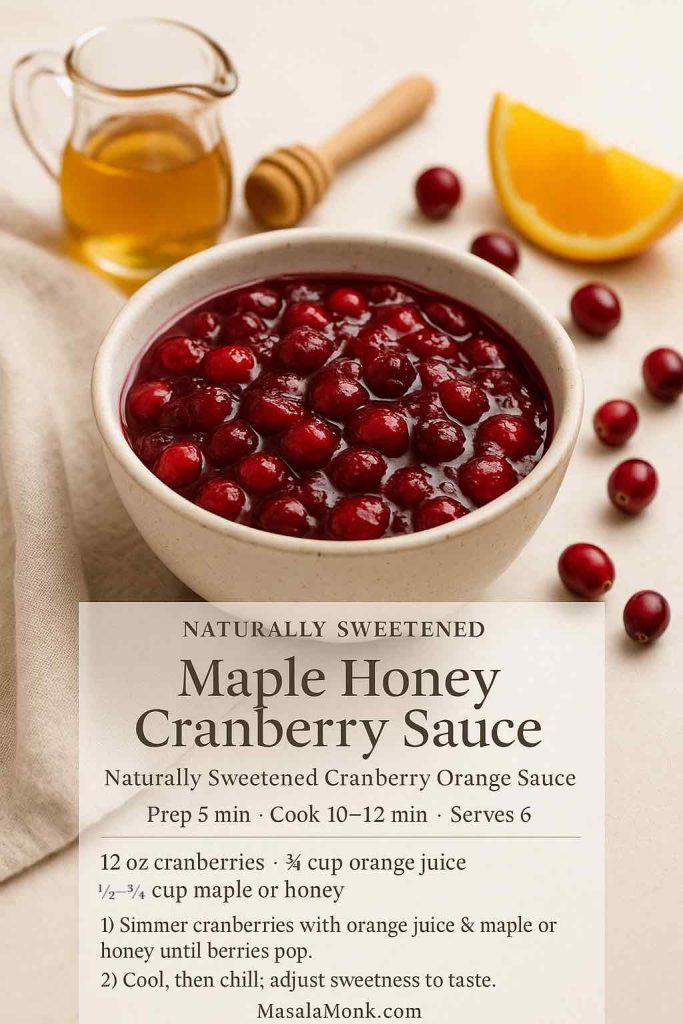
There are cocktails that feel like a project, and then there are cocktails that feel like a decision. The cranberry Moscow mule sits firmly in that second camp: you grab a bottle of ginger beer, you find a lime, you pour, you stir, and suddenly the glass looks like a holiday postcard.
That’s the quiet charm of this drink. It can be a cozy Christmas Moscow mule, a bright Thanksgiving cranberry mule, a casual cranberry mule cocktail after work, or the kind of holiday mule you make when friends “just happen” to stop by. Either way, you get the same three-note magic: ginger heat, citrus snap, and that tart-sweet cranberry glow that makes the whole thing taste like winter without tasting heavy.
Even better, it’s easy to steer. Want something sharper? You lean into lime. Prefer it rounder and sweeter? You choose cranberry cocktail instead of 100% juice or add a touch of syrup. Craving something more aromatic? Rosemary, thyme, or orange peel transforms the drink in seconds. And if you’re making cranberry moscow mules for a crowd, a pitcher base takes the stress out of hosting.
If you like having a dependable starting point before you riff, Masala Monk’s guide to the classic mule template is a great foundation: Moscow Mule Recipe: Master Ratio + 10 Easy Variations. From there, cranberry slides in naturally—like the drink was always meant to wear red.
Why Ginger Beer and Cranberry Juice Work So Well Together
At first glance, ginger beer and cranberry juice sounds almost too simple. Yet the pairing makes sense the moment you sip it.
Cranberry brings bright acidity and a clean fruit note. Ginger beer brings spicy fizz and a slight sweetness. Put them together, and you get a cranberry ginger beer cocktail that tastes lively instead of sugary—especially once lime shows up to keep everything crisp.

That balance is the real “secret” here. A mule is essentially a bright, gingery highball; cranberry gives it holiday color and a tart backbone, but ginger beer keeps it from turning into straight-up juice. Meanwhile, lime keeps the drink from getting flat or cloying, which is why moscow mule with cranberry juice almost always tastes better when you don’t skip the citrus.
If you’ve ever wondered why two “mule” drinks can taste wildly different, the answer is often hiding in the mixer. Ginger beer tends to be bolder and more ginger-forward, while ginger ale is usually softer and sweeter; Food & Wine’s breakdown of the difference explains why the swap changes the entire drink’s profile (Ginger Beer vs. Ginger Ale), and Epicurious dives into how production and flavor affect cocktails (Ginger Beer vs. Ginger Ale). In other words: both can work, but they won’t taste the same—and cranberry amplifies that difference.
So if you’re using ginger ale because that’s what you have, you can still make a cranberry mule drink you’ll love; you’ll just want a bit more lime to keep the drink sharp and mule-like.
Also Read: Baked Ziti Recipe Collection: 15 Easy Variations
Cranberry Moscow Mule Ingredients (And What Each One Does)
A good cranberry mule recipe doesn’t need many ingredients, but each one has a job. Once you know what those jobs are, you can tweak the drink confidently—whether you’re building a spiced cranberry mule, an apple cranberry moscow mule, or a big batch cranberry moscow mule.
Vodka (or your spirit of choice)
Vodka keeps the drink clean and neutral, which is why cranberry vodka mule recipes are the classic lane. If you want a specific bottle recommendation, you can absolutely make a cranberry mule recipe with Tito’s—its smooth profile works well with tart juice and spicy ginger.
That said, vodka isn’t your only option. Later on, you’ll see how easily this becomes a gin mule, a whiskey cranberry mule, or a tequila cranberry mule with one simple swap.
Cranberry juice (the fork in the road)
This is where people unknowingly choose their drink’s personality.
- Cranberry juice cocktail (sweetened) gives you a crowd-pleasing holiday mule cocktail that’s easy to sip.
- 100% cranberry juice makes the drink tarter, brighter, and more “grown-up,” but it often benefits from a touch of sweetener.
If you’re chasing the best cranberry mule recipe for a party, cranberry cocktail is typically the easiest win. On the other hand, if you love sharp drinks, 100% cranberry can be stunning—especially when you add a teaspoon or two of syrup to round the edges.
Ginger beer (the mule’s engine)
Ginger beer is what makes this drink a mule instead of a vodka cranberry with bubbles. It brings spice, fizz, sweetness, and a slightly fermented tang.
If you’re curious about classic proportions for a Moscow mule, Serious Eats lays out the familiar format—vodka, lime, and 4–6 ounces of ginger beer—clearly and simply (Moscow Mule). Liquor.com offers a similarly straightforward approach (Moscow Mule Cocktail Recipe). Those classics are useful here because cranberry is an add-on, not a replacement. You’re still building a mule; you’re just tinting and flavoring it.
Fresh lime juice (non-negotiable if you want the “mule” taste)
Bottled lime juice can work in a pinch, yet fresh lime gives the drink a brightness that plays beautifully with cranberry. More importantly, it keeps ginger beer and cranberry juice from tasting like a sweet soda.
Ice (more important than it looks)
A mule is at its best when it’s cold and crisp. Lots of ice keeps the ginger beer lively and slows dilution so the drink stays balanced.
Copper mugs (optional—and worth one safety note)
Copper mugs are fun and iconic, although a highball glass is perfectly fine. If you do use copper, it’s smart to choose a lined mug because acidic drinks (ginger, lime) can encourage copper to leach from unlined copper vessels. KFF Health News summarizes research and recommends lined mugs as a safer option (Don’t Nurse That Moscow Mule). You don’t need to panic; you just don’t want an unlined copper cup holding an acidic drink for a long time.
Also Read: Manhattan Cocktail Recipe (Classic + 6 Variations)
The Cranberry Moscow Mule Recipe (Single Drink)
This is the version you’ll come back to again and again—the one you can make by memory once you’ve done it twice.
Ingredients (1 drink)
- 2 ounces vodka
- 1 ounce cranberry juice (cocktail or 100%, your call)
- 1/2 ounce fresh lime juice
- 4–6 ounces cold ginger beer
- Ice
Method
- Fill a copper mug or tall glass generously with ice.
- Add vodka, cranberry juice, and lime juice.
- Top with ginger beer.
- Stir gently, just enough to combine.
- Garnish and serve immediately.

If you want the fastest possible route—almost a “dump and stir” approach—Food Network’s cranberry mule is famously minimal: vodka, cranberry juice, ginger beer, ice, garnish (Cranberry Mule Recipe). That style is great when you’re making drinks while chatting, because it’s nearly impossible to mess up. Still, adding lime makes the drink taste more like a true mule and less like a sweet highball, so consider it the small extra step that pays you back with every sip.
Also Read: Green Chutney Recipe (Coriander–Mint / Cilantro Chutney)
Garnishes That Make It Look Like a Holiday Moscow Mule
A cranberry mule already looks festive, but garnishes change the experience as much as they change the photo.
- Fresh cranberries: classic, simple, and instantly “holiday.”
- Rosemary sprig: the aroma hits before the sip, which makes it feel like a Christmas mule cocktail.
- Thyme: softer than rosemary, more delicate, and quietly elegant.
- Orange peel: warm citrus perfume that turns it into an orange cranberry moscow mule moment.
- Lime wheel: keeps things bright and crisp.

If you want to go all-in, sugared cranberries are the easiest “wow” garnish because they look fancy and take almost no effort. Alternatively, an orange peel and rosemary sprig together makes the drink smell like winter as soon as you lift the mug.
Also Read: Best Vermouth for a Negroni Cocktail Drink Recipe
Christmas Moscow Mule Recipe (The Holiday Mule Version)
The difference between an everyday cranberry mule and a Christmas moscow mule isn’t a new ingredient list—it’s the way you layer aroma and warmth.

Start with the base cranberry Moscow mule recipe. Then:
- Add a rosemary sprig and a handful of cranberries.
- Express an orange peel over the mug (twist it to release the oils), then drop it in.
- If you like a sweeter edge, add a small spoon of simple syrup before the ginger beer and stir lightly.
As the drink sits, rosemary perfumes the ginger, orange lifts the cranberry, and suddenly it tastes like a holiday mule without tasting like a candle. That’s the sweet spot.

If your holiday table already includes cranberry-orange flavors, it’s also fun to pair this drink with something like Cranberry Sauce with Orange Juice, because the same flavor family shows up on both the plate and the glass. The result feels cohesive without feeling planned.
Also Read: Sandwich for Breakfast: Breakfast Sandwich Recipe + 10 Variations
Cranberry Lime Moscow Mule (For People Who Like It Crisp)
Sometimes you want the cranberry to be present but not sweet. In that case, pull the drink toward citrus.
Make the base recipe, then:
- Use 100% cranberry juice, and
- Increase lime slightly (a fuller half ounce, or even a touch more if your ginger beer is sweet).

What you get is a cranberry lime mule that drinks clean and bright. It’s the kind of mule that tastes refreshing even after a rich meal, which is exactly why it fits a holiday spread so well.
Also Read: Paper Plane Cocktail Recipe + Best Amaro Substitutes & Tips
Cranberry Orange Moscow Mule (Warm Citrus Without Heaviness)
Cranberry and orange is a classic duo, and it fits the mule format naturally. Instead of making the drink sweeter, orange adds perfume and warmth.
You can do it two easy ways:
- Orange peel garnish method: build the base drink, then add orange peel and stir.
- Orange juice method: replace a small portion of cranberry juice with orange juice (just enough to bring in the aroma without turning it into a brunch drink).

If you want inspiration from a more “designed” version, Bobby Flay’s cranberry-orange mule recipe leans into cranberry vodka and orange notes for a festive spin (Cranberry-Orange Mule). You don’t need to follow it exactly to enjoy the idea; even a simple orange peel garnish can shift your cranberry mule cocktail into a more holiday-forward direction.
Also Read: Strawberry Smoothie Recipes (12 Easy Blends + Bowls & Protein Shakes)
Apple Cranberry Moscow Mule (Cran-Apple, But Make It a Mule)
Apple and cranberry together taste like fall and winter in one sip. The trick is keeping the apple from making the drink taste like sparkling juice.
Here’s the approach that stays mule-like:
Apple Cranberry Mule (1 drink)
- 2 ounces vodka
- 1 ounce cranberry juice
- 1 ounce apple cider (or cloudy apple juice)
- 1/2 ounce lime juice
- Ginger beer to top
Build it over ice, then garnish with apple slices and cranberries.

Liquor.com’s apple cranberry moscow mule goes directly at the “cran-apple” idea using cran-apple juice and a smaller lime measure, then tops with ginger beer (Apple Cranberry Moscow Mule). It’s a great reference point if you want that specific flavor lane.
If you’re serving a mix of drinkers—some doing alcohol, some not—an apple-forward zero-proof option fits nicely alongside this version. Masala Monk’s apple juice mocktails are handy for that kind of table, since you can keep the same garnish style and make everything look intentional.
Also Read: Classic Rum Punch + 9 Recipes (Pitcher & Party-Friendly)
Spiced Cranberry Moscow Mule (Cinnamon, Thyme, and Winter Warmth)
A spiced cranberry mule should feel like winter, not like potpourri. The goal is warmth in the background, not a spice rack in the foreground.
Spiced Cranberry Mule, Cinnamon Style
Build the base drink, then add:
- a tiny pinch of cinnamon, or
- a cinnamon stick as garnish, or
- a dash or two of aromatic bitters (if you keep them around)
Cinnamon plays especially well with cranberry and orange peel, so it’s also a natural fit for a Christmas mule cocktail.

Spiced Cranberry Thyme Moscow Mule
Thyme is subtler than rosemary, which means it’s easier to use without overpowering the drink.
Build the base drink, then:
- clap a thyme sprig between your hands to wake up the aroma
- garnish with the sprig and stir gently once
The result feels like a spiced cranberry thyme mule—fresh, herbal, slightly wintry—without losing that classic mule snap.
Also Read: 7 Pizza Sauce Recipes | Marinara, White Garlic, Alfredo, Buffalo, BBQ, Vodka & Ranch
Cranberry Rosemary Mule (That “Smells Like the Holidays” Version)
Rosemary is the garnish that does the most work with the least effort. It turns a cranberry moscow mule into a cranberry rosemary mule almost instantly.
Build the base drink, then:
- garnish with rosemary and cranberries
- stir lightly so the rosemary oils lightly perfume the top of the drink
Because rosemary is assertive, you don’t need to muddle it. In fact, muddling can make the herb taste woody. Instead, let it behave like a fragrant accent.

If you enjoy herbal directions in drinks in general—especially for alcohol-free versions—Masala Monk’s guide to herbal infusions in mocktails is a fun rabbit hole to go down. Rosemary and thyme show up often for a reason: they’re instantly aromatic and pair well with citrus.
Also Read: Vodka Pasta (Penne alla Vodka) + Spicy Rigatoni, Chicken, and Gigi Recipes
Cranberry Pomegranate Moscow Mule (A Deeper, Brighter Fruit Twist)
Cranberry is tart. Pomegranate is tart in a different way—more jewel-toned, slightly floral, and a little rounder.
For a cranberry pomegranate mule:
- Use half cranberry juice and half pomegranate juice in the base recipe
- Keep lime and ginger beer the same

The drink stays crisp, yet the fruit layer feels more complex. It’s a great option when you want something that tastes a little more “special occasion” without adding steps.
Also Read: Mayo Recipe: 15+ Homemade Mayonnaise Variations
Cranberry Vanilla Moscow Mule (A Soft, Dessert-Leaning Option)
If your ginger beer is sharp and you want the drink to feel smoother, vanilla can give it a gentle “holiday dessert” vibe.
There are a few easy routes:
- Use a small splash of vanilla syrup (the same kind you’d use in coffee), or
- Use vanilla vodka, or
- Add a tiny pinch of vanilla extract to a big batch base (very little goes a long way)

This turns the drink into a cranberry vanilla mule—still fizzy and gingery, just rounder at the edges. It’s especially nice with orange peel.
Also Read: Blueberry Pancakes (6 Recipes) + Homemade Pancake Mix
Choose Your Spirit: Vodka, Gin, Bourbon, Whiskey, or Tequila
One reason “mule” drinks are so popular is that the template welcomes substitutions. Once you’ve made a cranberry mule with vodka, you can spin it into several other crowd-pleasing directions.

Cranberry Vodka Mule (Classic and Clean)
This is the standard cranberry mule recipe: vodka, cranberry, lime, ginger beer. It’s the most neutral, the most widely loved, and the easiest to batch.
If you like the idea of balancing citrus and sweetness in simple highballs, Masala Monk’s vodka with lemon guide explains the logic behind adding a little syrup to keep tartness bright rather than harsh—an idea that carries over beautifully when you use unsweetened cranberry.
Gin Mule (Cranberry Gin Mule)
Swap vodka for gin and you’ll get a cranberry gin mule that feels more aromatic and botanical. Rosemary garnish becomes even more compelling here, because gin and rosemary play beautifully together.

This is a great “holiday mule” option when you want something that tastes a touch more complex without adding any extra ingredients.
Bourbon Cranberry Mule (Whiskey Cranberry Mule / Cranberry Kentucky Mule)
Swap vodka for bourbon (or whiskey) and the drink turns warmer and richer. That’s why bourbon cranberry mule and whiskey cranberry mule variations show up so often in colder months: the vanilla-caramel notes in bourbon make cranberry taste more like a winter fruit.

If you want the drink to feel extra seasonal, add orange peel and a cinnamon stick and you’ve basically got a Christmas mule drink that tastes like it belongs next to a fire.
Tequila Cranberry Mule (Cranberry Mexican Mule)
Swap vodka for tequila blanco and you’ll get a brighter, punchier drink. The cranberry becomes sharper, the ginger feels louder, and orange peel suddenly makes a lot of sense.

If you enjoy margarita-style flavors, this version is a natural bridge—especially with a salt-sugar rim or a chili-salt rim if you like heat.
Also Read: Whiskey Sour Recipe: Classic Cocktail, Best Whiskey & Easy Twists
Big Batch Cranberry Moscow Mule (Pitcher Recipe That Actually Works)
If you’re hosting, the best gift you can give yourself is a plan that doesn’t require you to play bartender all night. A cranberry moscow mule pitcher base does exactly that.
The most important rule: batch everything except the ginger beer.
Ginger beer is your fizz, so you want it fresh. Once it sits in a pitcher, it goes flat, and your big batch cranberry moscow mule turns into a sweet, diluted punch. Still tasty, but not the drink you meant to make.
Big Batch Cranberry Mule Base (About 8 Drinks)
- 2 cups vodka
- 1 cup cranberry juice
- 1/2 cup fresh lime juice
- Optional: 1/4 to 1/2 cup simple syrup (especially if using 100% cranberry juice)
Stir this base in a pitcher and chill it thoroughly.
To Serve
Fill each mug with ice, pour in the base, then top with ginger beer. Stir gently and garnish.

That’s it. Suddenly, cranberry moscow mule large batch service becomes effortless. You can chat, refill the snack table, and actually enjoy your own party.
If you want a reference point for a “no-fuss” cranberry mule direction, Food Network’s approach is as straightforward as it gets (Cranberry Mule Recipe), and it scales easily. Meanwhile, if you like a more styled holiday direction that leans orange and cranberry, Bobby Flay’s cranberry-orange mule is a fun idea to borrow elements from when you’re building your garnish bar (Cranberry-Orange Mule).
A Simple Hosting Rhythm (So You’re Not Stuck in the Kitchen)
Instead of pre-pouring full drinks, set up a “build your own” station:
- a chilled pitcher of cranberry mule base
- ginger beer bottles on ice
- a bowl of cranberries
- sliced limes
- rosemary and thyme sprigs
- orange peels or orange slices

That small setup makes holiday moscow mules feel abundant, even if you’re keeping things casual.
Also Read: Waffle Recipe Without Milk: Fluffy, Golden, and Crisp
Virgin Cranberry Moscow Mule (The Zero-Proof Version That Still Feels Festive)
A virgin cranberry moscow mule shouldn’t feel like a consolation prize. It should taste like a real drink—bright, fizzy, gingery, and finished with the same garnishes as the alcoholic version.
Virgin Cranberry Mule (1 drink)
- 2–3 ounces cranberry juice
- 1/2 ounce lime juice
- Ginger beer to top
- Ice
Build over ice, stir gently, and garnish with cranberries and rosemary.

If you want a clear, tested reference for the non-alcoholic format, Skinnytaste’s cranberry mule mocktail keeps it clean with cranberry juice, ginger beer, and lime (Cranberry Mule Mocktail). You can keep it that simple, or you can dress it up the same way you would a Christmas mule cocktail: rosemary, orange peel, sugared cranberries, the whole works.
For a more “grown-up” herbal direction—especially if you’re serving mocktails at a holiday gathering—Masala Monk’s piece on herbal mocktail infusions is a nice source of ideas. Even one sprig of rosemary can make a zero-proof drink feel intentional.
Also Read: Sheet Pan Chicken Fajitas Recipe (Easy One-Pan Oven Fajitas)
Ginger Ale, Ginger Beer, and Cranberry: Two Easy Routes
Sometimes the question isn’t “which cranberry mule recipe should I make?” It’s “what do I do with what’s already in my fridge?”

If you have ginger beer
You’re in classic mule territory. Build the drink normally. You’ll get more spice, more bite, and a more defined mule identity.
If you only have ginger ale
You can still make a moscow mule recipe with cranberry juice that tastes refreshing. It will be softer and sweeter, so lean into lime a little more. Those differences are exactly why guides like Food & Wine and Epicurious emphasize that ginger beer and ginger ale aren’t interchangeable without changing the result (Food & Wine’s comparison, Epicurious’ comparison).
Either way, cranberry and ginger is a winning pairing. You just steer the balance with lime and sweetness.
Also Read: Strawberry Mojito Mocktails – 10 Easy Variations
What to Serve With Cranberry Moscow Mules (So the Night Feels Complete)
A cranberry mule cocktail is fizzy, gingery, and slightly tart. That means it loves food that’s creamy, salty, crunchy, or gently spicy. In other words, it pairs beautifully with party snacks.
Instead of trying to cook ten things, aim for contrast:
- one creamy dip
- one crunchy bite
- one “fresh” element
- one cozy holiday side if you’re doing dinner
Here are combinations that work especially well.
Creamy dips and spreads
A creamy dip softens the ginger bite and makes the drink feel smoother.
- A classic option is Easy Spinach Dip (Cold, Baked, Artichoke & 10 Variations). It’s rich enough to balance the drink, yet it still feels party-friendly rather than heavy.
- If you want something bolder, Buffalo Chicken Dip is a natural match because spicy, tangy food and fizzy ginger drinks tend to make each other more exciting.
- For something cool and bright, Greek tzatziki pairs beautifully with the lime and cranberry notes, especially alongside roasted or fried snacks.
One-bite, tidy appetizers
This is the category that makes a gathering feel effortless.
- Classic deviled eggs with variations are quietly perfect with a mule, because the creamy filling plays nicely with ginger and citrus.
- If you want a crowd-pleasing crunch factor, 10 easy potato appetizers cover everything from crispy to cheesy, and that salty edge is excellent with cranberry.
The “hot and crispy” anchor
Every snack table benefits from one warm, crisp tray that disappears quickly.
- Air fryer chicken wings are ideal here: spicy wings plus a cranberry mule is the kind of pairing that keeps people hovering near the table.
Boards and grazing plates (the easiest party trick)
If you want the room to feel festive without cooking all day, a board does most of the work.
Masala Monk’s guide to charcuterie boards and the 3-3-3-3 rule makes it easy to build something abundant. Add crackers, cheese, something briny, something sweet, and a bowl of cranberries as a playful nod to the drink. With a holiday mule in hand, it feels like an event.
Holiday sides that make everything feel seasonal
If you’re serving these drinks with dinner—especially if you’re leaning into Christmas moscow mule vibes—cozy sides fit right in.
- Green bean casserole is a classic companion to a holiday table, and it works surprisingly well with a crisp cranberry mule because the drink cuts through creamy, savory dishes.
- If cranberry is already on your menu, cranberry sauce with orange juice ties the whole spread together, especially if you’re also making a cranberry orange mule variation.
And if you want something simple that helps dips disappear even faster, homemade garlic bread is a cozy, crowd-friendly move—particularly when the weather is cool and the drinks are icy.
Also Read: Katsu Curry Rice (Japanese Recipe, with Chicken Cutlet)
A Cranberry Mule You’ll Actually Make Again
The best thing about this drink is that it doesn’t ask you to commit. You can keep it simple—vodka, cranberry, lime, ginger beer—and it’s already delicious. Then, whenever you feel like it, you pivot:
- rosemary and cranberries for a cranberry rosemary mule
- orange peel for a cranberry orange moscow mule
- apple cider for an apple cranberry mule
- cinnamon and thyme for a spiced cranberry mule
- bourbon for a whiskey cranberry mule
- tequila for a cranberry mexican mule
- a pitcher base when you’re making cranberry moscow mules for a crowd
- zero-proof when you want a virgin cranberry moscow mule that still feels special
No matter which direction you choose, the drink keeps its personality: bright, fizzy, gingery, and unmistakably festive.
Also Read: Peanut Butter Cookies (Classic Recipe & 3 Variations)
FAQ
1) What is a cranberry Moscow mule?
A cranberry Moscow mule is a Moscow mule made with vodka, ginger beer, lime juice, and cranberry juice. Compared to a classic mule, it tastes fruitier, looks more festive, and often shows up as a holiday mule or Christmas mule cocktail.
2) What are the cranberry Moscow mule ingredients?
Typically you’ll need vodka, cranberry juice, fresh lime juice, ginger beer, and ice. Afterward, garnishes like cranberries, rosemary, lime, or orange peel make it feel more seasonal.
3) How do I make a cranberry mule cocktail taste less sweet?
If your cranberry mule tastes too sweet, first increase the lime juice slightly. Next, choose a less-sweet cranberry juice (or reduce the cranberry portion) and use a spicier ginger beer for more bite and balance.
4) Can I use 100% cranberry juice in a cranberry moscow mule recipe?
Yes—however, 100% cranberry juice is much tarter than cranberry juice cocktail. Because of that, many people add a small amount of simple syrup to soften the edges while keeping the drink bright.
5) What’s the best ginger beer for a cranberry ginger beer mule?
Since ginger beers vary a lot, pick based on your preference: a spicier ginger beer creates a sharper mule, while a sweeter ginger beer makes a smoother cranberry mule drink. Either way, fresh lime keeps it tasting like a mule.
6) Can I make a moscow mule recipe with cranberry juice and ginger ale?
You can. Even so, ginger ale is usually sweeter and less spicy than ginger beer, so the result will be softer and closer to a cranberry highball. To bring it back toward mule territory, add a bit more lime and use plenty of ice.
7) What vodka works best for a cranberry mule recipe?
Any smooth vodka works well. In particular, a cranberry mule recipe with Tito’s is popular because it’s clean and easy-drinking, letting ginger and cranberry stand out.
8) How do I make an easy cranberry moscow mule?
For an easy version, fill a mug with ice, add vodka and cranberry juice, then top with ginger beer and squeeze in lime. Finally, stir once and garnish—done.
9) How do I make a Christmas Moscow mule recipe?
To turn it into a Christmas mule drink, keep the base recipe and add holiday garnishes such as rosemary sprigs, fresh cranberries, and orange peel. Optionally, add a cinnamon stick for a cranberry cinnamon moscow mule feel.
10) What is an apple cranberry Moscow mule?
An apple cranberry Moscow mule is a cranberry mule variation that includes apple cider or apple juice along with cranberry, then finishes with ginger beer and lime. As a result, it tastes like a cran-apple mule with the classic mule fizz.
11) How do I make an apple cider cranberry Moscow mule?
Instead of using only cranberry juice, use a split—cranberry plus apple cider—then add vodka, lime, and ginger beer. In addition, cinnamon garnish pairs especially well with this version.
12) Can I make a spiced cranberry Moscow mule?
Absolutely. For instance, add aromatic bitters, a cinnamon stick, or a light dusting of cinnamon. Alternatively, use herbs like thyme for a spiced cranberry thyme Moscow mule that still tastes fresh.
13) What’s the difference between a cranberry rosemary mule and a cranberry thyme moscow mule?
Rosemary is more piney and bold, while thyme is gentler and more floral. Consequently, rosemary gives a stronger holiday aroma, whereas thyme keeps the drink lighter.
14) What is a cranberry pomegranate Moscow mule?
A cranberry pomegranate mule combines cranberry juice with pomegranate juice, then adds vodka, lime, and ginger beer. Because pomegranate is naturally tangy, it deepens the fruit flavor without making the drink heavy.
15) Can I make a cranberry mule with gin?
Yes—swap vodka for gin to make a gin mule or cranberry gin mule. Compared to vodka, gin adds botanical notes that taste especially good with rosemary or orange peel.
16) How do I make a bourbon cranberry mule or whiskey cranberry mule?
Replace vodka with bourbon or whiskey. Then build the drink the same way with cranberry, lime, and ginger beer. In turn, the flavor becomes warmer and richer, similar to a cranberry Kentucky mule style.
17) Can I make a tequila cranberry mule (Mexican mule)?
Definitely. Use tequila blanco instead of vodka, then add cranberry juice, lime, and ginger beer. For extra lift, garnish with orange peel or a lime wheel.
18) How do I make a big batch cranberry Moscow mule?
Make a pitcher base with vodka, cranberry juice, and lime juice, and chill it. Then, when serving, pour the base over ice and top each glass with ginger beer so the fizz stays lively.
19) What’s the best cranberry moscow mule pitcher recipe for a crowd?
A reliable approach is batching vodka + cranberry + lime in advance, then topping with ginger beer per glass. That method scales easily for a cranberry moscow mule for a crowd, a large batch cranberry mule, or a party pitcher.
20) How far ahead can I prep a cranberry moscow mule batch?
You can mix the vodka, cranberry juice, and lime juice several hours ahead and keep it refrigerated. Still, add ginger beer only at serving time to maintain carbonation.
21) Can I make a virgin cranberry Moscow mule?
Yes—a virgin cranberry mule uses cranberry juice, lime juice, and ginger beer over ice. For a more “holiday mule” feel, garnish with rosemary and cranberries just like the cocktail.
22) Can I use cranberry vodka in a moscow mule with cranberry vodka?
Yes. Cranberry vodka works well and reinforces the fruit notes. Even so, keep lime in the recipe so it doesn’t drift into overly sweet territory.
23) What can I use instead of lime in a cranberry mule recipe?
If you’re out of lime, lemon can work. Nevertheless, lime is the classic mule citrus and tends to pair best with ginger beer and cranberry.
24) Why does my cranberry mule taste flat?
Usually it’s because the ginger beer wasn’t cold, the drink sat too long, or it was stirred too aggressively. To fix it, use chilled ginger beer, add it last, and stir gently.
25) Can I serve cranberry mules for Thanksgiving and Christmas?
Yes—cranberry mules fit both. For Thanksgiving, apple cider and cinnamon variations feel especially fitting. For Christmas, rosemary, orange, and pomegranate versions look and smell extra festive.





































